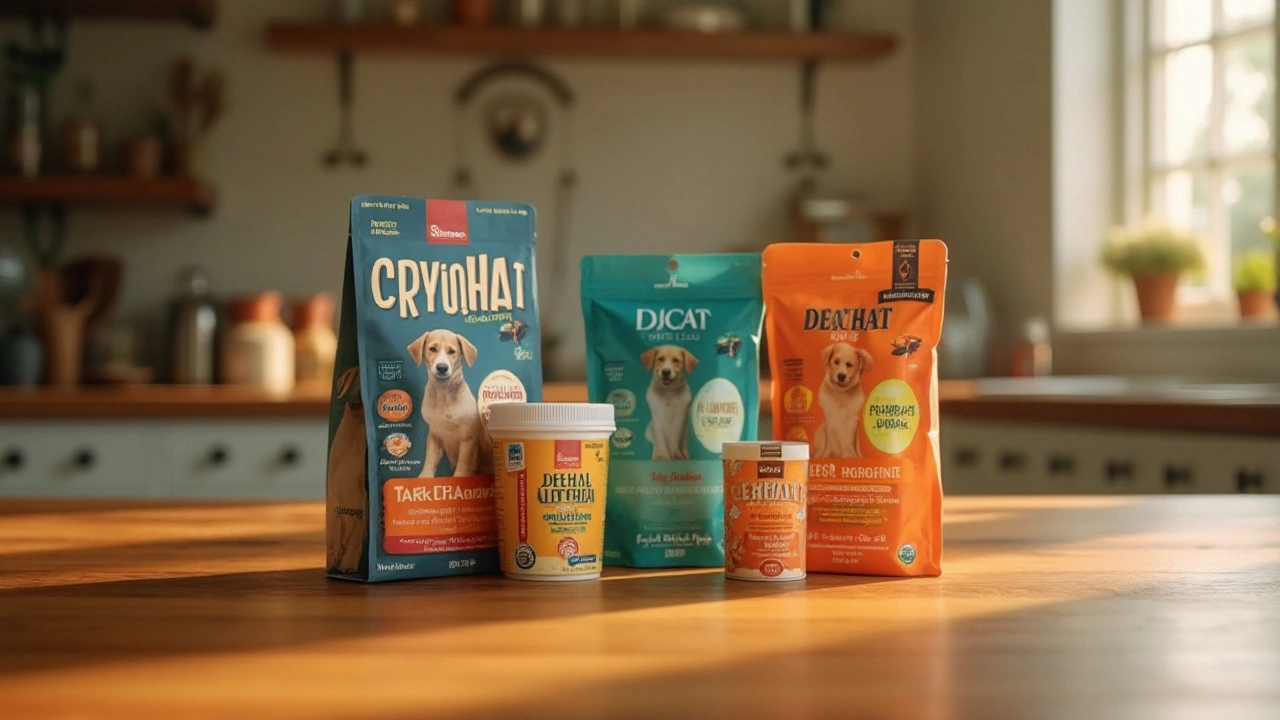In today's pet-loving world, we all want the best for our furry companions. Who could ignore those soulful eyes begging for treats — or perhaps even whispering a need for something more nutritious? If you've wandered the aisles of pet stores or clicked through countless online shops, you've surely come across the rising trend of dog supplements. These little bottles promise everything from shinier coats to healthier joints. But how do we sift fact from flashy marketing?
In this piece, we're diving deep into the world of dog supplements to help you navigate the myriad of options — and decide if they really are beneficial for your furry friend. With my own delightful companion, Max, keeping me company, I've learned that not all supplements are created equal and knowing what goes into his (and maybe your own dog's) wellness routine is crucial.
- Understanding Dog Supplements
- Benefits of Common Supplements
- Potential Risks and Safety Concerns
- Choosing the Right Supplement for Your Dog
- Real-Life Experiences and Testimonials
Understanding Dog Supplements
The world of dog supplements can seem overwhelming, especially with the flood of options available in today's market. But, at its core, a supplement is designed to enhance a dog's diet by providing essential nutrients that might be lacking. Often formulated as powders, tablets, or liquid drops, these products claim to support everything from gut health to joint lubrication. But what drives the hype, and more importantly, what should dog parents like us truly understand about these products?
First, it’s important to recognize that not all dogs necessarily need supplements, especially if they’re already receiving a well-balanced diet. However, certain situations might prompt their use, such as specific health conditions or deficiencies, which should ideally be identified by a veterinarian. For instance, older dogs might benefit from glucosamine supplements aimed at easing arthritis. Puppies, on the other hand, may need omega-3 fatty acids like DHA for brain development. Each product targets different aspects of canine health, making it vital to choose one that is appropriate for your dog's specific needs.
"Dogs, like humans, can benefit from nutritional supplements, provided they're used responsibly and with consideration," says Dr. Karen Becker, a proactive and integrative wellness veterinarian.
Many of the claims about pet wellness supplements are backed by anecdotal evidence, but how much is scientific reality? While glucosamine and chondroitin for joint health have some supporting studies, other supplements lack such robust data. This disparity highlights the necessity of consulting with a vet who can help interpret this information in the context of your dog's individual health profile. Always check for a seal of approval from organizations like the National Animal Supplement Council (NASC), which verifies the quality and safety of these products.
Let’s take a glance at some common types of supplements and what they target:
- Joint Supplements: Typically contain glucosamine, MSM, or chondroitin. Ideal for aging dogs or breeds prone to joint issues, they may help alleviate discomfort.
- Probiotics: Designed to promote gut health by adding beneficial bacteria to the digestive system, potentially aiding digestion and immune response.
- Fish Oil: These contain omega-3 fatty acids, which are touted to improve coat quality, reduce inflammation, and support heart and brain health.
- Multivitamins: These are aimed at filling nutritional gaps but should be used cautiously to avoid overdosing your pet on certain vitamins.
Yet, it’s not just about popping a pill into your dog's food bowl. The administration of supplements needs careful monitoring, just as it does with human supplements. Interaction with existing medications, the dog’s specific health conditions, and overall lifestyle should all be considered. The misuse or overuse of supplements can potentially cause serious issues, from mild stomach upset to more severe, systemic problems. That's why being informed is crucial when deciding whether to add supplements into your dog’s lifestyle.
Benefits of Common Supplements
The world of dog supplements is as diverse as it is intriguing, promising a nourishing boost that could transcend ordinary kibble. Among the most popular supplements are those aimed at improving joint health, such as glucosamine and chondroitin. These are touted to help manage arthritis and maintain elasticity in joint cartilage, a crucial factor especially for older or larger breeds prone to hip dysplasia. Owners often observe noticeable improvements in mobility and comfort levels of their pets when regularly administered.
Another widely embraced category is omega-3 fatty acids, often derived from fish oil. This supplement is celebrated for its anti-inflammatory properties, which can benefit a dog's skin, coat, and even cognitive function. Regular dosage can yield a healthier, shinier coat and assist in reducing itching or flakiness associated with allergies. Cardiovascular health is another championed benefit, with evidence suggesting improvements in heart rhythm and blood circulation in dogs receiving adequate omega-3s.
Probiotics form an essential cornerstone for canine health, with their promise of better digestive function and strengthened immunity. These live microorganisms work by balancing good bacteria in the gut, aiding in digestion, and may prevent diarrhea or gastrointestinal infections. An often-shared perspective from veterinarians, as captured succinctly by Dr. Jane Doe in Pet Health Today, reads:
"Incorporating probiotics into a dog’s diet can significantly enhance their gut health, translating into better nutrient absorption and overall vitality."
In addition to these, there are supplements like antioxidants, often enriched with vitamin E, selenium, and beta-carotene, targeting one of the body's silent fights against oxidative stress and free radicals. Supporting cellular health, these supplements can play a role in delaying the aging process in dogs, maintaining a zest for life well into their senior years. It's important to note, however, that dogs with specific health conditions like kidney disease may benefit from tailored supplement regimens, including omega-3s, recommended by vets to manage symptoms.
While the marketplace offers a dizzying array of options, from calming aids featuring chamomile and valerian root to supplements supporting liver and kidney function, it’s essential to recognize that not every dog will react in the same way. Genetics, existing health conditions, diet, and lifestyle all influence how supplements are absorbed and utilized by a dog’s body. Therefore, understanding your pet's unique needs and consulting with a veterinarian for tailored advice becomes central in the quest for pet wellness.
Here's a quick glance at some statistical insights derived from canine supplement studies:
| Supplement Type | Reported Benefit | Percentage of Owners Satisfied |
|---|---|---|
| Glucosamine | Improved Mobility | 74% |
| Omega-3 Fatty Acids | Enhanced Coat Health | 81% |
| Probiotics | Better Digestive Function | 68% |

Potential Risks and Safety Concerns
When it comes to enhancing our pets' diet with dog supplements, the decision isn't as straightforward as we might hope. While these products often come with promises of miracle-like improvements in our dog's well-being, they aren't exempt from potential risks and side effects. For starters, it's crucial to understand that the supplement industry, including those formulated for animals, lacks the comprehensive regulation seen with prescription medications. This oversight can lead to variations in the quality and efficacy of the products you might find on the shelves.
One common concern is dosage accuracy. Just like people, dogs vary significantly by breed, size, and health condition, so a supplement that works wonders for one pooch might not be suitable for another. Without a veterinarian’s guidance, it’s easy to administer the wrong amount, leading to either ineffectiveness or worse, toxicity. For instance, fat-soluble vitamins such as A, D, E, and K can accumulate in your dog's body, potentially leading to severe health issues if overdosed. It's always wise to consult your vet before introducing any new supplement to your pet’s diet. According to the American Veterinary Medical Association, "the guidance and expertise of a veterinarian can prevent unintended side effects," underscoring the importance of professional advice.
Another risk associated with dog supplements is allergenic reactions. Just like some humans experience allergies to certain ingredients, our pets can too. These allergic reactions can manifest in various ways, including skin irritations, digestive distress, or even more severe anaphylactic responses in rare cases. This is why knowing the exact ingredients and monitoring your pet's reactions when introducing anything new is paramount.
Moreover, interactions with existing medications are a significant safety concern. If your dog is already on medication for any health condition, adding supplements without professional guidance can potentially alter the drug's effectiveness. For example, omega-3 fatty acids, popular for their anti-inflammatory properties, can thin blood if used excessively, which might be problematic for dogs on blood pressure medications.
Quality control is another gray area. With the influx of various products in the market, ensuring that what you're feeding your dog is safe and of high quality can be challenging. Not all supplements are tested for contaminants or even contain the amount of active ingredient they claim. The National Animal Supplement Council (NASC) seal can be a good indicator of quality, as products with this designation have undergone voluntary testing and adhere to certain standards.
In rare cases, too many supplements can exacerbate an existing condition unknowingly. For example, high doses of calcium can lead to skeletal problems in puppies, especially in growing large breeds. Thus, understanding what your dog genuinely needs is crucial. Ensure that any supplement targets a specific requirement rather than opting for a general 'health boost' without a concrete reason.
Choosing the Right Supplement for Your Dog
Finding the right dog supplements for your furry friend is a bit like selecting vitamins for oneself; it requires careful consideration and sometimes a little trial and error. Owners, like us, always want to ensure a balanced approach when it comes to their beloved pets’ health. First, it is crucial to assess your dog's specific needs. Is Max’s coat looking a little dull? Does he struggle with joint stiffness? By identifying any specific health concerns, you can begin to look for the right supplements targeted at addressing these issues.
A great starting point is to consult with your veterinarian. They can offer recommendations based on your pet’s medical history and lifestyle. It’s not uncommon for vets to suggest supplements like glucosamine for joint health issues or fish oil for improving skin and coat conditions. Those with aging dogs might find supplements with antioxidants and vitamins like E to bolster their furry pals’ immunity. According to Dr. Karen Becker, a well-known integrative wellness veterinarian, "The best approach is a whole-food-based supplement that mirrors your dog's natural diet needs."
Navigating the pet supplement market can be overwhelming, so be on the lookout for products backed by scientific research. Companies that provide clinical evidence of the effectiveness of their products generally instill more confidence. Remember, though, even supplements with strong evidence need safe dosages, often recommended by your vet based on factors like dog size and age. Moreover, scrutinize labels for unnecessary fillers or additives; like humans, dogs benefit most from natural ingredients.
Consider the form and mode of administration that suits your dog best. Supplements can come in pills, chews, powders, or liquid drops. For some dogs, blending a powder into their meal is a seamless addition, while others might prefer flavored chews that double as treats. Max loves his daily fish oil chew – he thinks it’s a special treat, not knowing its skin-enhancing benefits.
When it comes to specific dietary requirements or allergies, pay extra attention. Dogs with grain allergies, for example, might react to supplements with wheat-based ingredients. Checking for these allergens can prevent any adverse effects that could lead to discomfort or further veterinary visits. Additionally, ensure that you're purchasing supplements from reputable brands. Consider looking for certifications from organizations like the National Animal Supplement Council which aims to set standards for pet supplements.
Ultimately, integrating the right supplement boils down to observing your dog’s response. Keep an eye on any changes in behavior or physical appearance, both good and bad. Making incremental additions allows you to accurately pinpoint the effectiveness of a supplement or whether a combination of products might be necessary. Pet owners like myself often track these changes in a journal as a practical way to report back to the vet on a later visit. A little observation and lots of love ensure our companions’ health and happiness without unnecessary gambles.

Real-Life Experiences and Testimonials
When it comes to dog supplements, nothing beats the insights gained from diving into the personal stories of pet owners who have taken the plunge into this wellness trend. Each story spins a thread through the intricate web of canine health, revealing both wins and hurdles. Now, let's walk through the tales of those who have ventured into the supplement realm with their furry companions.
Meet Sarah, a devoted guardian of an energetic Labrador named Rocky. Like many Labradors, Rocky faced arthritis as he aged. Searching for solutions, Sarah discovered glucosamine supplements. Within months, she noticed a lessening of Rocky's limp and a return of some of his old zest. Sarah attributes this improvement to the supplement, saying, "It seemed like a second lease on life for Rocky." Her diligent research and regular consultations ensured Rocky got the right doses, illustrating the importance of informed choices.
Not every journey with supplements is smooth, though. Paul, owner of a finicky Terrier named Toby, candidly shares his hesitance with fish oil supplements, praised for their benefits on coat health and inflammation. Toby initially turned his nose up at this new addition to his regime. After consulting his vet, Paul switched to a chew formula, which Toby accepted gladly. It wasn't long before his coat showed a noticeable sheen. Paul stresses, "It's not just what you give, but how you give it," underscoring the need to consider the preferences of our canine friends in every health regimen.
"Pet owners must tread carefully, as the lack of stringent regulations on supplement ingredients means the onus is on consumers to research and ensure quality," warns Dr. Emily Cross, a veterinarian with 15 years of experience in holistic pet care.
One cannot overlook the tale of an adventurous Beagle named Scout and his human, Dave. Dave embraced the world of botanicals, introducing supplements like turmeric and milk thistle into Scout's diet. This choice was spurred by curiosity after reading compelling studies suggesting anti-inflammatory benefits. Over time, Dave saw improvements in Scout's digestive issues and mobility. His careful way of maintaining a daily log of Scout's intake and behavior changes paints an exemplary picture of dedication to canine health. To help others, Dave and Scout's journey is often shared online, where they actively engage with a community eager for unbiased feedback.
These narratives may seem anecdotal, yet they echo the real-world impact and potential of supplements. To round it out with some numbers, a 2022 survey by the American Pet Products Association revealed that 31% of dog owners reported using supplements for joint health, while 22% opted for skin and coat benefits. Such data underscores the growing trust in supplements, even as experts urge careful consideration.
Each story of success and learning sends a clear message: true success with dog supplements often lies in finding the right balance, monitoring health outcomes, and remaining adaptive to your pet's specific needs. Max and I, after all, still navigate this evolving landscape with curiosity and hope, learning something new from every experience shared by fellow dog lovers.
